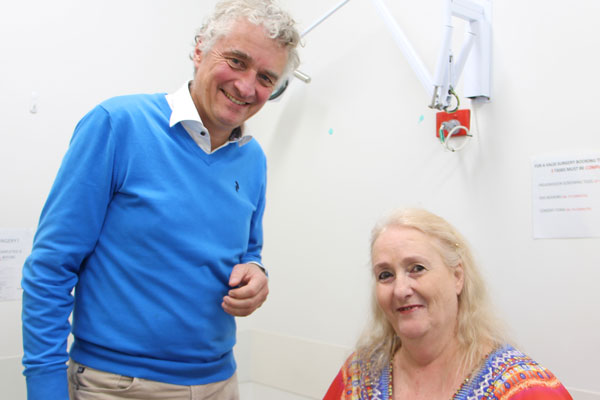Queensland launches Australian-first orthopaedic infection specialist centre

JTI Director Professor Michael Schuetz with patient Christine Ebrey
Increased care and shorter hospital stays are expected for around 900 Queenslanders each year who are treated for implant device-related infection, as the Royal Brisbane and Women’s Hospital debuts Australia’s first specialist centre this month.
The pilot program, in partnership with Jamieson Trauma Institute, follows successful models in Oxford and Berlin which boast multidisciplinary treating teams to improve patient outcomes.
Jamieson Trauma Institute Director Professor Michael Schuetz said the multidisciplinary Device-Related InFection Team (mDRIFT) specialist centre will aim to improve clinical outcomes, reduce hospital stay times by 30 per cent, and reduce the tremendous treatment costs for those patients suffering implant related infections due to its streamlined approach between orthopaedic, infectious disease, microbiology and plastic surgery departments.
“Patients experiencing device related infections often have to juggle a number of appointments with different specialists, and for many regional patients, this means significant travel time with appointments not always aligning,” Professor Schuetz said.
“With a new inpatient ward, as well as an outpatient specialist centre, we will aim to reduce time spent in hospital while equally improving treatment for the many Queenslanders who experience post-surgery complications.”
Ipswich’s 61-year-old Christine Ebrey knows first-hand the difficulties navigating both orthopaedic and infectious disease appointments separately, following a fracture to her knee a decade ago.
After falling over while shopping for Christmas gifts in 2010, Christine experienced a number of complications from her broken femur enduring more than 10 operations over the past 10 years.
It was only in October last year Christine was admitted to Royal Brisbane and Women’s Hospital again for another surgery, when a number of infections were noticed including an infection which is attracted to the metal used to fix Christine’s femur fracture.
Christine will remain on antibiotics for the foreseeable future as well as continuing to balance numerous hospital appointments with orthopaedic, infectious disease and physiotherapy treating teams.
She will be one of the mDRIFT’s first patients when it opens its doors early August, admitting the efficiency of seeing her treating doctors together will be a huge time-saver.
“I have spent so much time in hospital over the past decade, juggling a number of doctors and physio appointments, blood tests and x-rays – it will make life so much easier to see treating teams at the same time,” Ms Ebrey said.
“This new approach can give people back more time in their life, particularly those of us who live outside Brisbane.”
For Christine, she is confident with ongoing physio her muscles will become strong enough to allow the metal plates in her leg to be removed, which would mean her infection would heal.
“I would like to be able to do the little things like walk my dog again and get out in the garden as I really miss that,” Ms Ebrey said.
“It’s been a long road but I’m hopeful I’ll be better soon.”
In addition to providing specialist advice and care to those who visit RBWH, the new specialist centre is developing an online consultation portal to assist doctors in rural and remote locations, where the burden of orthopaedic infection is significant but capability to manage is limited.
